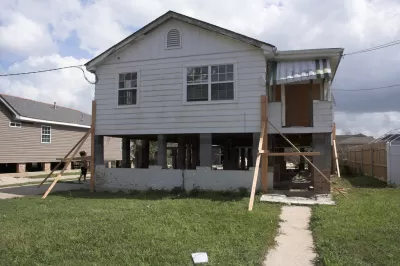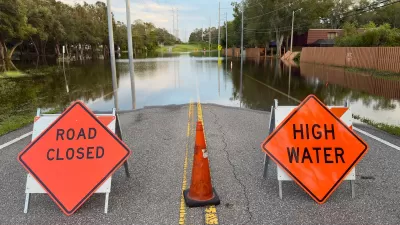Housing market pressures, flood insurance costs, changing FEMA maps, and improved methods of flood control are giving victims of flood damage in Louisiana mixed signals on how high they should rebuild their homes.

As Baton Rouge dries out from its record flooding, homeowners will have a tough choice to make as they seek to rebuild. How high will they need to elevate their homes to avoid future flooding that is becoming more commonplace? David Mitchell of The Advocate reports that a variety of changes in flood insurance requirements, flood maps, and improvements in flood control are giving homeowners less incentive to raise the height of their homes, as was seen across the city of New Orleans following Hurricane Katrina.
Area leaders around Baton Rouge already have an eye on easing the path to return. Baton Rouge and Ascension officials in recent weeks moved to loosen parish rules that had been tighter than FEMA minimum standards, set that way years ago to reap the benefit of lower flood insurance rates.
They have already eliminated requirements that homeowners build to the “record inundation,” an as yet unknown height that local officials feared could be even higher and more expensive than that required for base flood elevations.
Just last week the Metro Council in East Baton Rouge also shifted elevation requirements to the FEMA minimum by eliminating a city-parish rule that would have required some flooded properties in locations not deemed to be at highest risk to elevate. The change spares 32,000 flooded homes -- an estimated half of those that flooded in the parish -- from a possible elevation requirement.
The cost for homeowners to elevate their homes to the base flood elevation has proven costly—forcing homeowners to tear down their existing, damaged homes and just rebuild rather than elevate the existing structures. In New Orleans, a program to provide grants to homeowners to help elevate their homes has largely been sidelined, in favor of a more comprehensive response to contain and prevent future flooding.
FULL STORY: After Katrina, house elevations in New Orleans depended on timing, funding, mindset

Planetizen Federal Action Tracker
A weekly monitor of how Trump’s orders and actions are impacting planners and planning in America.

Maui's Vacation Rental Debate Turns Ugly
Verbal attacks, misinformation campaigns and fistfights plague a high-stakes debate to convert thousands of vacation rentals into long-term housing.

Restaurant Patios Were a Pandemic Win — Why Were They so Hard to Keep?
Social distancing requirements and changes in travel patterns prompted cities to pilot new uses for street and sidewalk space. Then it got complicated.

In California Battle of Housing vs. Environment, Housing Just Won
A new state law significantly limits the power of CEQA, an environmental review law that served as a powerful tool for blocking new development.

Boulder Eliminates Parking Minimums Citywide
Officials estimate the cost of building a single underground parking space at up to $100,000.

Orange County, Florida Adopts Largest US “Sprawl Repair” Code
The ‘Orange Code’ seeks to rectify decades of sprawl-inducing, car-oriented development.
Urban Design for Planners 1: Software Tools
This six-course series explores essential urban design concepts using open source software and equips planners with the tools they need to participate fully in the urban design process.
Planning for Universal Design
Learn the tools for implementing Universal Design in planning regulations.
Heyer Gruel & Associates PA
JM Goldson LLC
Custer County Colorado
City of Camden Redevelopment Agency
City of Astoria
Transportation Research & Education Center (TREC) at Portland State University
Jefferson Parish Government
Camden Redevelopment Agency
City of Claremont





























